|
|
|
Sort Order |
|
|
|
Items / Page
|
|
|
|
|
|
|
| Srl | Item |
| 1 |
ID:
188452
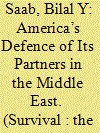

|
|
|
|
|
| Summary/Abstract |
The main factors American presidents typically consider before committing military resources to protect a partner include perceived US national interests, US domestic politics, the nature of the attack itself, the aggressor’s military capabilities and the possibility of escalation. An additional factor is the ability and willingness of the partner to conduct joint and combined operations with the United States and possibly others. This is critically important in the Middle East. As Washington prioritises the Indo-Pacific and Europe, US military forces will draw down in the Middle East and be less able to intervene promptly. To maintain strong regional deterrence, security arrangements between the United States and its Arab partners should be reconfigured to ensure that they can confront regional threats, Iran’s in particular, without immediate American assistance. The will require American advice and assistance in creating sustainable and effective joint forces.
|
|
|
|
|
|
|
|
|
|
|
|
|
|
|
|
| 2 |
ID:
188459
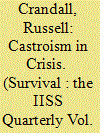

|
|
|
|
|
| Summary/Abstract |
Since the middle of the twentieth century, Fidel Castro has cast an outsized shadow over all things Cuba, as if the Cuban leader and the communist Caribbean nation were one and the same. Yet, as veteran New York Times correspondent Anthony DePalma contends in his book The Cubans: Ordinary Lives in Extraordinary Times, this reflex obfuscates the complex society that is increasingly at cross purposes with all things Fidel. The author’s keen profiles of ‘ordinary’ citizens give readers an unvarnished entry into the so often unimaginable, surreal or heart-breaking realities at the core of contemporary Cuban life.
|
|
|
|
|
|
|
|
|
|
|
|
|
|
|
|
| 3 |
ID:
188454
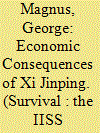

|
|
|
|
|
| Summary/Abstract |
In the aftermath of the 20th National Congress of the Chinese Communist Party, Xi Jinping’s principal focus will be on state and national security, while an entirely new economic- and financial-policy team, with little experience, will take charge of China’s troubled economy. Its members will have to manage several systemic problems – a debt mountain, a property bust, a rapidly ageing population, zero-COVID policies – and develop a viable new economic-development model. This would be a demanding agenda anywhere, but Xi’s China has to tackle it guided by an ever more devoutly Leninist approach to economic management, industrial policy and governance, at a time when China faces the most hostile external environment it has known since Mao Zedong, as exemplified by foreign decoupling. Although Xi’s China is capable of important accomplishments in science and technology, and of flexing its diplomatic and military muscles in defence of its interests, China’s politics may be much less capable of fixing the country’s systemic economic and financial weaknesses. The consequences of Xi Jinping’s economic programme, including an emphasis on self-reliance, promise to extend beyond China’s borders to foreign actors and countries that once benefited from its economic rise.
|
|
|
|
|
|
|
|
|
|
|
|
|
|
|
|
| 4 |
ID:
188450
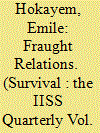

|
|
|
|
|
| Summary/Abstract |
The recalibration of Saudi foreign policy under Crown Prince Muhammad bin Salman (MbS) reflects Riyadh’s changing assessment of its relationship with the United States and its ambition to become a full-fledged geo-economic power that is less constrained by the traditional pillars of Saudi statecraft. While much attention is being paid to the acrimonious relationship between MbS and US President Joe Biden, there are structural reasons for the growing divergence between the two countries. The October 2022 OPEC+ crisis over Saudi Arabia’s oil-production cut illustrates how Riyadh is willing to prioritise its financial and energy interests even at the risk of upsetting its long-time security partner.
|
|
|
|
|
|
|
|
|
|
|
|
|
|
|
|
| 5 |
ID:
188451
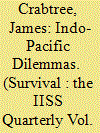

|
|
|
|
|
| Summary/Abstract |
The United States intends to manage China’s rise by forging a new balancing coalition of ‘like-minded’ partners and by developing deeper ties with other nations in the Indo-Pacific that view themselves as broadly non-aligned. Washington hopes that closer ties to the US and its partners will stop such countries from drifting towards China. But to create these deeper relationships, the non-aligned group also needs reassurance that attempts by the like-minded partners to integrate capabilities and fashion a new regional balance of power will not tip the Indo-Pacific towards conflict. Like-minded nations will need to appreciate the risks that security initiatives like the Quad and AUKUS are perceived to create, realise that Hanoi or Jakarta is unlikely to embrace Canberra’s or Tokyo’s vision of the region’s future warmly, and be willing to make substantial material investments. Tension between integration and reassurance will inevitably endure.
|
|
|
|
|
|
|
|
|
|
|
|
|
|
|
|
| 6 |
ID:
188453
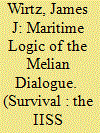

|
|
|
|
|
| Summary/Abstract |
There is a maritime logic embedded in Thucydides’ ‘Melian Dialogue’ that until now has attracted little notice; observers have instead concentrated on the deeper philosophical and moral issues highlighted by Thucydides in his tale drawn from the Peloponnesian War. Nevertheless, the maritime logic that propelled a confrontation on the island nation of Melos nearly 2,500 years ago could re-emerge in the run-up to a conflict in the Western Pacific. Allies are the strategic enabler of the US naval presence in the region, and US forces are taking steps to develop concepts and doctrine to enable operations in and along the First Island Chain. Denying access to these logistical facilities might be a political priority for China in the run-up to potential military action, and it would not be surprising if Beijing delivered a simple message to the inhabitants of the First Island Chain: stay out of it, and we will leave you out of it. All of this suggests that the idea of ‘neutrality’, as encountered in the Melian Dialogue, might again emerge during a crisis. Because the incentives to restrict US access to forward-operating bases are so clear-cut, strategists need to anticipate the emergence of ideas related to limiting the ability of US naval units to use port and air facilities in the Western Pacific.
|
|
|
|
|
|
|
|
|
|
|
|
|
|
|
|
| 7 |
ID:
188456
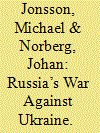

|
|
|
|
|
| Summary/Abstract |
After Vladimir Putin declared a partial Russian mobilisation in late September 2022 and annexed four additional Ukrainian regions, there was little to suggest that a negotiated settlement would be possible while he remained in power. This article instead explores three possible military outcomes of the war – an outright Ukrainian or Russian military victory, and a war of attrition. As of November 2022, a Ukrainian victory, so unlikely at the outset of Russia’s invasion, is a distinct possibility, provided the West offers sufficient military materiel and training swiftly enough. Russian forces have suffered heavy casualties and are low on precision-guided munitions, with their logistics under fire and having lost much of what air dominance they had. Hence, Moscow’s battlefield fortunes hinge on whether mobilised, poorly trained and equipped forces will be able to hold defensive lines over the winter to buy time to build new, more capable units, with troop morale ever more crucial, but also brittle. A key unknown, however, is the state of Ukrainian forces. Importantly, the scale and intensity of the war, the vital interests at stake and international involvement on both sides all gravitate towards a more drawn-out war over the winter and beyond.
|
|
|
|
|
|
|
|
|
|
|
|
|
|
|
|
| 8 |
ID:
188455
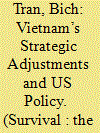

|
|
|
|
|
| Summary/Abstract |
Vietnam has become an important space for Sino-US strategic competition. Hanoi is reluctant to choose a side, however. The main objectives of its foreign policy have been to avoid conflict, develop the domestic economy and defend the homeland. To advance these goals, Vietnam has maintained a strategy of independence, autonomy, openness and multilateralisation, diminishing the role of communist ideology, shifting from a continental to a maritime orientation, and enhancing its international status. A thorough understanding of these developments could enable the United States and other democratic countries to build closer ties with Vietnam and other Southeast Asian countries.
|
|
|
|
|
|
|
|
|
|
|
|
|
|
|
|
| 9 |
ID:
188458


|
|
|
|
|
| Summary/Abstract |
Russian President Vladimir Putin has repeated nuclear threats in connection with the war in Ukraine since Russia invaded on 24 February 2022, and senior Russian military leaders have reportedly considered when and how Moscow might use a tactical nuclear weapon in Ukraine. On 27 October, in this context of rising nuclear risks, the US Department of Defense released its Nuclear Posture Review. It describes the present moment as a time to prepare rather than negotiate. Although now is not the time to begin negotiations towards a formal arms-control treaty, the end of the war in Ukraine will be an important opportunity for pursuing post-crisis arms-control efforts. Meanwhile, during this arms-control interlude, the United States and its allies should lay the groundwork for future arms-control efforts.
|
|
|
|
|
|
|
|
|
|
|
|
|
|
|
|
| 10 |
ID:
188457
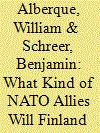

|
|
|
|
|
| Summary/Abstract |
Barring a Turkish veto, Finland and Sweden will join NATO as full members prior to the Alliance’s Vilnius Summit in June 2023. Both confront several political, military and defence-industrial choices regarding their membership, with different benefits and opportunity costs for each country and the Alliance depending on whether they select a low, medium or high level of ambition. Both are likely to adopt a medium level of ambition, opening up a range of new areas for cooperation with other allies and strengthening the Alliance as a whole. A high level of ambition is not likely in the short term, given the substantial political, financial and personnel costs it would entail. Nevertheless, it could eventually materialise.
|
|
|
|
|
|
|
|
|
|
|
|
|
|
|
|
|
|
|
|
|